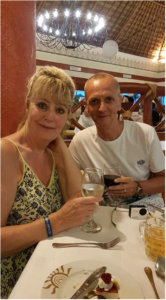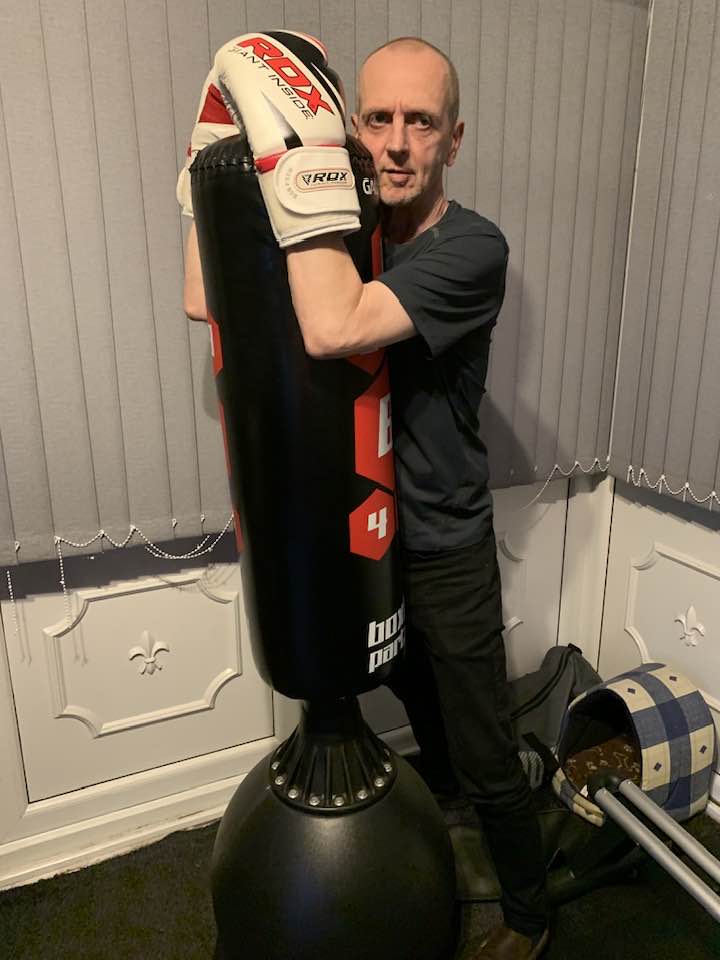An interview with Chris Duffy on Advocacy on October 18, 2023 by George Ackerman, Ph.D, J.D.

Biography
I am Chris Duffy a 60-year-old man from Bury in Greater Manchester UK. I’ve been married to Linda for 14 years and I’ve been diagnosed 5 years. I’m a normal family man with stepchildren and grandchildren.
I enjoy social events, eating out, drinks with friends and family occasions and I worked for over forty years as a sales manager in the construction industry.
Please tell me a little about your background.
I’m the oldest of three. I have a brother Phil and a sister Jane who are twins and are two years younger than myself. Perhaps because my wife and Phil’s wife are sisters.
We socialize together and since my diagnosis, I tend to be the center of my siblings attention,, which makes it quite difficult to make them understand that I’ve kind of got this thing ! It no longer overwhelms me like it did when I was first diagnosed. I’ m no longer the patient and I’m still who I was.
Can you tell me more about your advocacy?
Following my diagnosis, I began to join young onset PD social groups and slowly realized that although PD ,especially young onset PD, is a devastating diagnosis, lots of sufferers choose to deal with it, either through exercise or adapting and adopting a different lifestyle, mindset and perception of the illness.
These interactions between us are uplifting and truly joyful and sometimes interspersed with interjections of black humor. have become the place where I feel at home, because only those who have PD can understand fully your life.
These tenacious, funny, sometimes inspirational people gather around the terrified newly diagnosed and they demonstrate how life can go on and be joyful following a diagnosis.
For my part I preach exercise as a way of influencing my outcome and taking positive action to regain some control.
Those in the group are like family, there’s brother and sisterly bond that becomes threaded within us and we rely on each other during those dark times.
I also write blogs for various PD websites Via Facebook and the like.
What is your passion and how did you get involved in Parkinson’s awareness and hope for a cure?
I’m always keen to learn about new treatments for Parkinson’s but have given up on a cure in my lifetime.
When I was first diagnosed, I volunteered to take part in a clinical trial of a new drug. Sadly, after two years of being injected with this potion every month it proved to be ineffective, and the trial stopped.
My friends within the community said I was brave to volunteer for such a trial but conversely, I regarded as an act of selfishness and cowardice because had there been a cure, I was thinking selfishly, hoping to obtain a cure for myself.
What type of goals do individuals with Parkinson’s have when seeing your advocacy?
My first “lightbulb” moment came many years ago in a gym in Blackburn, when I witnessed a young guy, mid-forties in a wheelchair strapped on a pair of boxing gloves and wheeled himself up to a punch bag.
He rose out of his chair and got to his feet for about 20 seconds where he beat the daylights out of the bag, swearing, cursing and sweating, for about a minute, where he dropped back into his chair.
I realized that for him, this was stress relief, where he took out his frustration on the punch bag.
This inspired me to ramp up my exercise regime. The people I encounter instinctively pick themselves up when life knocks them down and this they demonstrate in the gym.
They have an inner strength and an instinctive skill to carry on with life as normally as possible.
What type of exercise do you do to fight the disease progression?
I have a rowing machine and tread mill at home, along with weights and a stepper. I try to get an hour at least three times a week.
What effect can your advocacy have on an individual with Parkinson’s?
I attempted suicide and I ‘m not ashamed to tell my story because I would now advocate that we choose to live. Looking back, I can laugh at some of my experiences. On reflection my suicide attempt was funny although I’m an atheist.
I have since spoken to two PD warriors who were contemplating suicide and I have managed to convince these people that any day above ground is a good day.
What would you like to see as a future goal for your advocacy?
The newly diagnosed should have CBT Counselling for free and be referred to a gym specializing in neurological disorders.
What events do you participate in?
Walking football, Gym, Social events.
How does your advocacy also assist caregivers?
I like to think I motivate others, both patients and caregivers.
How can someone get in touch? What is your website?
My Email address is therealslimshaky6382@aol.com
How can others also become advocates for awareness?
I would simply urge anyone newly diagnosed to get involved and meet others in local PD social groups and exercise as much as you can.
How do I deal with and continue with my life as normal following diagnosis?
The answer is you just do! My way of dealing with diagnosis was to write it down, and I was therapeutic.
If you had one final statement or quote you could leave for the Parkinson’s community, what would it be?
Parkinson’s taught me patience, perspective and purpose.
You must be patient and learn to do ordinary tasks differently. You have to look at challenges from different perspectives and you need to find your purpose.

